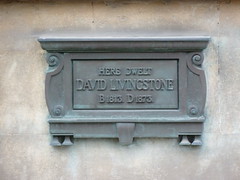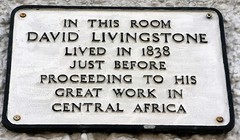David Livingstone


David Livingstone
(1813-1873)
son-in-law of Mary Moffat
Commemorated on 3 plaques
David Livingstone Missionary and Explorer lived here in the year 1857. Born in 1813 Died in 1873
Livingstone Cottage, Hadley Green, London, United Kingdom where they was
In this room David Livingstone lived in 1838 just before proceeding to his great work in central Africa
, Ongar, United Kingdom where they lived (1837)



